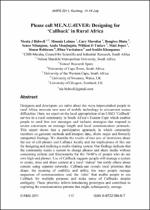JavaScript is disabled for your browser. Some features of this site may not work without it.
- ResearchSpace
- →
- Research Publications/Outputs
- →
- Conference Publications
- →
- View Item
| dc.contributor.author |
Bidwell, NJ

|
|
| dc.contributor.author |
Lalmas, M

|
|
| dc.contributor.author |
Marsden, G

|
|
| dc.contributor.author |
Dlutu, B

|
|
| dc.contributor.author |
Ntlangano, S

|
|
| dc.contributor.author |
Manjingolo, A

|
|
| dc.contributor.author |
Tucker, WD

|
|
| dc.contributor.author |
Jones, M

|
|
| dc.contributor.author |
Robinson, S

|
|
| dc.contributor.author |
Vartiainen, E

|
|
| dc.date.accessioned | 2011-09-22T08:04:19Z | |
| dc.date.available | 2011-09-22T08:04:19Z | |
| dc.date.issued | 2011-07 | |
| dc.identifier.citation | Bidwell, NJ, Lalmas, M, Marsden, G, et al. 2011. Please call ME.N.U.4EVER: Designing for‘Callback’ in Rural Africa. Proceedings of the Tenth International Workshop on Internationalisation of Products and Systems. Kutching, Malaysia, 11-14 July, 2011, pp. 21pp | en_US |
| dc.identifier.uri | http://hdl.handle.net/10204/5153 | |
| dc.description | Proceedings of the Tenth International Workshop on Internationalisation of Products and Systems. Kutching, Malaysia, 11-14 July, 2011 | en_US |
| dc.description.abstract | Designers and developers are naïve about the ways impoverished people in rural Africa innovate new uses of mobile technology to circumvent access difficulties. Here, we report on the local appropriation of an USSD ‘Callback’ service in a rural community in South Africa’s Eastern Cape which enables people to send free text messages and includes strategies that respond to severe constraints on message length and local communication protocols. This report shows that a participative approach, in which community members co-generate methods and interpret data, elicits major and formerly unreported findings. We describe the results of two sets of interviews about the use of cell-phones and Callback locally and the implications of this use for designing and realizing a media-sharing system. Our findings indicate that the community needs a system to charge phones and share media without consuming airtime and functionality for the 70-80% of people who do not own high-end phones. Use of Callback suggests people will manage a system to create, store and share content at a local ‘station’ but notify others about content using separate networks. Callback-use reveals local priorities that shape: the meaning of usability and utility; the ways people manage sequences of communication; and, the ‘rules’ that enable people to use Callback for multiple purposes and make sense of Callbacks despite ambiguity. These priorities inform introducing prototypes and contribute to exploring the communication patterns that might, subsequently, emerge. | en_US |
| dc.language.iso | en | en_US |
| dc.relation.ispartofseries | Workflow;6934 | |
| dc.subject | Callback service | en_US |
| dc.subject | Mobile technology | en_US |
| dc.subject | Mobile usage | en_US |
| dc.subject | Rural African mobile usage | en_US |
| dc.title | Please call ME.N.U.4EVER: Designing for‘Callback’ in Rural Africa | en_US |
| dc.type | Conference Presentation | en_US |
| dc.identifier.apacitation | Bidwell, N., Lalmas, M., Marsden, G., Dlutu, B., Ntlangano, S., Manjingolo, A., ... Vartiainen, E. (2011). Please call ME.N.U.4EVER: Designing for‘Callback’ in Rural Africa. http://hdl.handle.net/10204/5153 | en_ZA |
| dc.identifier.chicagocitation | Bidwell, NJ, M Lalmas, G Marsden, B Dlutu, S Ntlangano, A Manjingolo, WD Tucker, M Jones, S Robinson, and E Vartiainen. "Please call ME.N.U.4EVER: Designing for‘Callback’ in Rural Africa." (2011): http://hdl.handle.net/10204/5153 | en_ZA |
| dc.identifier.vancouvercitation | Bidwell N, Lalmas M, Marsden G, Dlutu B, Ntlangano S, Manjingolo A, et al, Please call ME.N.U.4EVER: Designing for‘Callback’ in Rural Africa; 2011. http://hdl.handle.net/10204/5153 . | en_ZA |
| dc.identifier.ris | TY - Conference Presentation AU - Bidwell, NJ AU - Lalmas, M AU - Marsden, G AU - Dlutu, B AU - Ntlangano, S AU - Manjingolo, A AU - Tucker, WD AU - Jones, M AU - Robinson, S AU - Vartiainen, E AB - Designers and developers are naïve about the ways impoverished people in rural Africa innovate new uses of mobile technology to circumvent access difficulties. Here, we report on the local appropriation of an USSD ‘Callback’ service in a rural community in South Africa’s Eastern Cape which enables people to send free text messages and includes strategies that respond to severe constraints on message length and local communication protocols. This report shows that a participative approach, in which community members co-generate methods and interpret data, elicits major and formerly unreported findings. We describe the results of two sets of interviews about the use of cell-phones and Callback locally and the implications of this use for designing and realizing a media-sharing system. Our findings indicate that the community needs a system to charge phones and share media without consuming airtime and functionality for the 70-80% of people who do not own high-end phones. Use of Callback suggests people will manage a system to create, store and share content at a local ‘station’ but notify others about content using separate networks. Callback-use reveals local priorities that shape: the meaning of usability and utility; the ways people manage sequences of communication; and, the ‘rules’ that enable people to use Callback for multiple purposes and make sense of Callbacks despite ambiguity. These priorities inform introducing prototypes and contribute to exploring the communication patterns that might, subsequently, emerge. DA - 2011-07 DB - ResearchSpace DP - CSIR KW - Callback service KW - Mobile technology KW - Mobile usage KW - Rural African mobile usage LK - https://researchspace.csir.co.za PY - 2011 T1 - Please call ME.N.U.4EVER: Designing for‘Callback’ in Rural Africa TI - Please call ME.N.U.4EVER: Designing for‘Callback’ in Rural Africa UR - http://hdl.handle.net/10204/5153 ER - | en_ZA |






